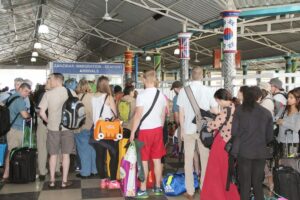
Dar es Salaam, Tanzania:
Tanzania Communications Regulatory Authority (TCRA) on Tuesday, January 3, said there are over two million unverified Subscriber Identification Modules (Sim cards) which could be misused for criminal offences.
The regulator, in collaboration with mobile network operators, are verifying Simcard registration, by ensuring the subscribers’ fingerprints match those in the National Identification Authority (NIDA) database.
Reporting on the verification, TCRA manager for telecom and internet management, Sadath Kalolo said 60,076,000 active Sim cards have been verified, with only 2,061,000 or 4.3 percent remaining.
TCRA has reiterated the call on non-compliant subscribers to verify their Sim card registration by end of January this year. Unverified Sim cards will be blocked after January 31, 2023, it said.
TCRA director general, Jabiri Bakari, announced the verification early last month, explaining that it was designed to protect innocent consumers against online crimes such as fraudulent activities and theft.
“Verification would succeed if all subscribers voluntarily and fully complied”, he added, emphasising that verification would make mobile communications safer for all.
Penalties for unregistered Sim cards are stated in the Electronic and Postal Communications (Sim card registration) Regulations.
Subscribers can verify the status of their Sim cards registration and be updated on those registered against their national identification numbers by dialling *106# on their mobile phones.
“Subscribers who discover any anomalies in their registration are urged to take up matters with the respective mobile service provider,” Dr Bakari said.
He emphasised that, every user of telecommunications services is required to verify his/her active phone number(s) using a citizenship ID or, alternatively, by using a NIDA provided National Identification Number-NIN, which can be obtained from the National Identification Authority-NIDA office.
The National Identification Authority (Nida) has also very recently introduced an online registration system that will, among other things, allow qualified persons to register for National Identification Cards (IDs) by filling out an online form from wherever they are.
Head of Nida’s Communications Department Geofrey Tengeneza told media last month that the online method is to reduce the hassle for applicants, who until now now have had to congregate at Nida offices to obtain application forms.
He said with the new system, filling out forms and uploading files will be possible from anywhere using a device capable of accessing the Internet, such as a smartphone, (unless of course it has been cut-off by TCRA) via eonline.nida.go.tz.
The procedure is not actually 100% online because after completing the form, the applicant must print it and send it to the local government where he lives to confirm his residency, and afterwards he then must send the form to the Nida office in the district where he lives with hard copies of the attachments he uploaded to the system to complete the procedure,” Mr Tengeneza explained.
The first batch of national IDs which were issued by the National Identification Authority (NIDA) in 2013 are set to expire from this year also (2023) and are set to cost Sh20,000 for renewal.
So with this added cost and any time delay on the process of obtaining a new or renewed NIDA card, it may mean that millions of unregistered SIM Card users will see their phones barred from January 31st 2023.
TCRA has identified several reasons for non-compliance with Sim card registration procedures, including criminal intentions.
In early November 2022 TCRA blacklisted and deactivated 52,087 international mobile equipment identities (IMEIs), including those involved in theft and fraudulent activities through mobile phone networks. An IMEI is a unique code used to identify an individual mobile telephone in Global Systems for Mobile (GSM) communication networks.
Share this news
This Year’s Most Read News Stories

Tanzanian insurance firms upbeat after first quarter business growth
Total gross written premiums for the insurance industry have increased by 13.68 percent in the first quarter of 2024, with small and medium-sized companies showing higher growthContinue Reading

Concerns mount over Zanzibar new $44 travel insurance fee
Tour operators, hoteliers, tourists, and tourism stakeholders are raising alarms over Zanzibar’s new mandatory $44 travel insurance fee, set to take effect on September 1.Continue Reading

Air Tanzania Banned From EU Airspace Due to Safety Concerns
Several airports have since locked Air Tanzania, dealing a severe blow to the Tanzanian national carrier that must now work overtime to regain its certification or go the wet lease way
The European Commission has announced the inclusion of Air Tanzania on the EU Air Safety List, effectively banning the airline from operating in European airspace.
The decision, made public on December 16, 2024, is based on safety concerns identified by the European Union Aviation Safety Agency (EASA), which also led to the denial of Air Tanzania’s application for a Third Country Operator (TCO) authorisation.
The Commission did not go into the specifics of the safety infringement but industry experts suggest it is possible that the airline could have flown its Airbus A220 well past its scheduled major checks, thus violating the airworthiness directives.
“The decision to include Air Tanzania in the EU Air Safety List underscores our unwavering commitment to ensuring the highest safety standards for passengers in Europe and worldwide,” said Apostolos Tzitzikostas, EU Commissioner for Sustainable Transport and Tourism.
“We strongly urge Air Tanzania to take swift and decisive action to address these safety issues. I have offered the Commission’s assistance to the Tanzanian authorities in enhancing Air Tanzania’s safety performance and achieving full compliance with international aviation standards.”
Air Tanzania has a mixed fleet of modern aircraft types including Boeing 787s, 737 Max jets, and Airbus A220s.
It has been flying the B787 Dreamliner to European destinations like Frankfurt in Germany and Athens in Greece and was looking to add London to its growing list with the A220.
But the ban not only scuppers the London dream but also has seen immediate ripple effect, with several airports – including regional like Kigali and continental – locking out Air Tanzania.
Tanzania operates KLM alongside the national carrier.
The European Commission said Air Tanzania may be permitted to exercise traffic rights by using wet-leased aircraft of an air carrier which is not subject to an operating ban, provided that the relevant safety standards are complied with.
A wet lease is where an airline pays to use an aircraft with a crew, fuel, and insurance all provided by the leasing company at a fee.
Two more to the list
The EU Air Safety List, maintained to ensure passenger safety, is updated periodically based on recommendations from the EU Air Safety Committee.
The latest revision, which followed a meeting of aviation safety experts in Brussels from November 19 to 21, 2024, now includes 129 airlines.
Of these, 100 are certified in 15 states where aviation oversight is deemed insufficient, and 29 are individual airlines with significant safety deficiencies.
Alongside Air Tanzania, other banned carriers include Air Zimbabwe (Zimbabwe), Avior Airlines (Venezuela), and Iran Aseman Airlines (Iran).
Commenting on the broader implications of the list, Tzitzikostas stated, “Our priority remains the safety of every traveler who relies on air transport. We urge all affected airlines to take these bans seriously and work collaboratively with international bodies to resolve the identified issues.”
In a positive development, Pakistan International Airlines (PIA) has been cleared to resume operations in the EU following a four-year suspension. The ban, which began in 2020, was lifted after substantial improvements in safety performance and oversight by PIA and the Pakistan Civil Aviation Authority (PCAA).
“Since the TCO Authorisation was suspended, PIA and PCAA have made remarkable progress in enhancing safety standards,” noted Tzitzikostas. “This demonstrates that safety issues can be resolved through determination and cooperation.”
Another Pakistani airline, Airblue Limited, has also received EASA’s TCO authorisation.
Decisions to include or exclude airlines from the EU Air Safety List are based on rigorous evaluations of international safety standards, particularly those established by the International Civil Aviation Organization (ICAO).

Sign up for free AllAfrica Newsletters
Get the latest in African news delivered straight to your inbox
The process involves thorough review and consultation among EU Member State aviation safety experts, with oversight from the European Commission and support from EASA.
“Where an airline currently on the list believes it complies with the required safety standards, it can request a reassessment,” explained Tzitzikostas. “Our goal is not to penalize but to ensure safety compliance globally.”
Airlines listed on the EU Air Safety List face significant challenges to their international operations, as the bans highlight shortcomings in safety oversight by their home regulatory authorities.
For Air Tanzania, this inclusion signals an urgent need for reform within Tanzania’s aviation sector to address these deficiencies and align with global standards.
The path forward will require immediate and sustained efforts to rectify safety concerns and regain access to one of the world’s most critical aviation markets.
Source: allafrica.com










